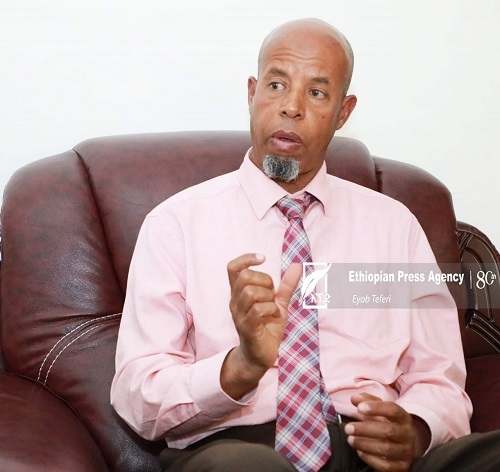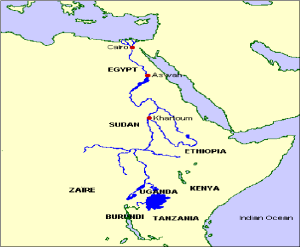
There are approximately 276 transboundary river basins on the planet with a geographical area corresponding to almost half of the earth’s surface and 60 percent of freshwater supplies. One of these rivers, and according to many sources, the longest in the world is the Abbay or Nile.
The Nile Basin is shared among 11 countries that stretch from East and Central Africa to North Africa. However, not all members of the basin have equally benefited from the River. Due to the unfair colonial period agreements Egypt and Sudan Have been utilizing almost the entire regime of the river.
The Nile Basin Initiative (NBI) is a partnership among the Nile riparian states that “seeks to develop the river cooperatively, share substantial socioeconomic benefits, and promote regional peace and security”. In May 2010, five upstream states signed the Cooperative Framework Agreement of the Initiative. Ethiopia, Uganda, Rwanda Tanzania, and Burundi have already ratified the agreement which enables the NBI to be established as Commission.
On the other hand, this historical development has stirred another geopolitical tension in the Horn of Africa region as Egypt, the strong opponent of the Initiative is trying to put pressure against Ethiopia indirectly through involvement in the security affairs in Somalia. This attempt by Egypt gained momentum after Ethiopia signed a Memorandum of Understanding with Somaliland for Maritime access this year.
The Ethiopian Herald has recently interviewed Feki Ahmed Negash, on the progress of the Nile Basin Initiative and the impact of Egypt’s military maneuverings in Somalia on the progress.
Feki Ahmed Negash is a consultant in water resource development and Transboundary River and hydro diplomacy in the Horn of Africa. Enjoy reading!

The Nile Basin Initiative progressed when South Sudan acceded to it by signing the agreement. What is next for the initiative?
When NBI was first signed in May 2010 it stated that the agreement would become binding when it is ratified by six member states. Then it will enter into force. The first task would be institutionalizing it. As indicated in the agreement AU will announce to the member states the binding status of the agreement 60 days after the sixth country that ratified the agreement deposits the instrument of the agreement. The first decision to be taken by the member states will be the establishment of the Nile Basin Commission (NBC). The establishment of the commission has been indicated in the agreement. In addition, an Institutional Design Study was conducted in 2010 along with the agreement. The design has already framed what the organization of the NBC should look like after analyzing the objective reality of the basin and other inputs. Since there is a long time gap since the study was conducted there is a need to update it. Moreover, the member states should also need to gather and pass decisions on how and when the commission should be established. So far the upper decision-making authority used to be the Council of Ministers (Drawn from Ministers of Water resources of the member states). By now this would be replaced by the Summit of Heads of State. The upcoming Summit of heads of state is scheduled to take place in Entebbe or Kampala [Uganda] in the coming weeks. This assembly is expected to pass a decision for the formation of the commission.
What are the changes that occurred after the first signing of the agreement in 2010 and called for updating of the Institutional Design Study?
The [Institutional Design] study was conducted in 2010. At that moment the agreement was signed by a few countries. It was even questionable if all 6 countries could ratify the agreement. The number of member states within the basin has also now increased with the coming of South Sudan as an Independent Country. It has also ratified the agreement. Sudan has also shown fundamental change. In addition, though it has not ratified the agreement, it has returned to the cooperation. It is part of the cooperation. I believe that Sudan will be the 1st country to join once the commission is established.
Many signs of progress have also occurred since then like an increase in population number, and development activities as there are many mega projects already underway in the region. There is a change in the economy of the member states as they are scoring rapid development. There is also a change in the structure as the interest of countries was only cooperation in the past but by now they may also be interested in engaging in development activities.
How would the Commission succeed in the Initiative by incorporating the achievements of the initiatives and also undertaking the required revisions?
The provisions of the Initiative indicate that the commission will succeed the NBI and will take over all the resources, facilities, experiences … etc. This means the Commission would not start from zero. The initiative will gradually evolve into a
commission. This will take some time.
What do you think would be the impact of the progress of NBI in changing the so far confrontation of the Upper and Lower Riparians of Nile? What do you think would happen next?
The agreement would have a binding effect against the signatory countries only. Those who have already endorsed the agreement are only the upper riparians except Kenya and the Democratic Republic of Congo (DRC). Kenya has signed the agreement but has not yet deposited the instrument signed by the President. Now that the agreement has already been signed by six countries I have hope that it will do so. DRC accepted the agreement and played a pioneering role in the signing of the agreement, but officially decided that it preferred to wait until Egypt and Sudan signed it.
Hence, there are a lot of works that the upper riparian should do. These countries share many underlying interests because all of them were victims of the colonial period agreement regarding the Nile water. They have not yet utilized the water so far. On top of that they have suffered from the various plots that were designed to prevent them from using the water. So I believe that they would choose to collaborate and embark on harnessing the river. Countries like Ethiopia have actually embarked on utilizing the river. It didn’t fall complacent due to the lengthy process of dialogues. But other countries have to some extent fallen complacent to it. If the upper riparians decide to plan together and implement separately, the lower riparian’s would be left with no alternative than trying to pressure for some time and after proving the futility of putting pressure they would finally join the agreement.
If the agreement is once declared binding by AU is there any likelihood that will reverse it?
Nothing can reverse the agreement once the six countries sign and deposit the document. If at all one or two signatories’ states opt out of the agreement, it cannot be reversed. The remaining states can carry on. Once the agreement becomes practical any country can leave but will have no effect of nullifying the agreement.
What about the political tension that flared up in the Horn of Africa between Ethiopia and Somalia? Do you think it would have an impact on the CFA or NBC?
One global experience shows that any agreement signed regarding water utilization would not be void even if the signatory countries go to war. For instance, we can see India and Pakistan. The two countries signed an agreement in the 1960s regarding the Indus River. They have engaged in war three times after that agreement. But they have never interrupted their collaboration even in the time of the war. Relevant authorities from both sides kept the mutual undertaking.
Regarding River Jordan, the agreement between Jordan, Palestine and Syria was always sustained despite the sporadic but protracted war and conflict in the region.
The political tension that is growing in the HoA at this moment is not because of other reasons than the issue of the Nile. If Egypt perceived the construction of GERD positively it would be a gain for both of us. But the utilization trend so far shows that one side was a beneficiary while the other was a mere onlooker. This is a dangerous trend. The one which is kept as an onlooker would take a harmful reaction later. But GERD never causes any harm to others. It is already witnessed. The GERD has already been filled up. Aswan Dam is also full. None of their farmers have also been dislodged contrary to their fears. This proves that the dam has no harm. But they view it as being a loser. They know the danger of compensating for their loss through water. Any conflict that emanates from water claims is very disastrous. By the way, no such conflict has ever been recorded in history yet. The only such incident that occurred in history is the 4500-year-old war between Uma and Lagash near Mesopotamia. Water is known for putting off fires rather than igniting them. International experience shows that there would be disagreement surrounding Transboundary Rivers, but they end up in agreement.
So I suppose that they are making a desperate attempt to put pressure through circumnavigating via Somalia. So we need to exercise wise leadership to manage this issue. No one would gain from conflict. Even the winner would collaterally lose many things. In another way, all parties to the conflict would eventually be losers. So we need restraint.
What do you think should be the role of AU, and IGAD to de-escalate the tension in the region?
What shrinks the role of IGAD is that Egypt is not a member of it. So the option is through AU. AU could have played a good role but Egypt still is suspicious about Aus’s impartiality as it believes that it is inclined towards [Ethiopia as it believes that it is an organization of the Black people or the black part of the continent]. So they prefer to resort to others like the United Nations Security Council (UNSC). They believe that AU inclined towards black people. So AU could have some role to play but it is not clear to what extent it can exercise influence. The main point here would be to resolve differences peacefully. We have now to work on addressing problems peacefully. Considering the tense situation, we are in it is better to avoid any possibility of conflict every issue has an alternative.
Some say that Egyptian Foreign policy regarding Nile water is contrary to the growth of Africa. Do you agree with that?
It is good to comprehend the concerns of Egypt. It is more of a desert. They have a lack of rain so lower riparians have this fear. Egypt should also understand that the upper riparian states live in poverty. So the policy they pursue today, which is weakening the upper riparian’s, prolonging negotiations and keeping the upper riparians under poverty cannot be a durable solution. These are short-lived and old-fashioned approaches. They have all to sit around a table and discuss. Upper riparian’s should show compassion and drag Egypt to join the dialogue or cooperation any time.
There are still unresolved issues. This can be solved when Egypt opts to engage in dialogue. I hope they are likely to come to dialogue with their own choice or under some compelling situations.
As you said both sides should understand each other. Have you seen any hint that could push Egypt to refrain from provocation and engage in dialogue?
By now the agreement is already signed and the commission is due to be established. They may continue efforts to tackle this process. It is possible to allow Egypt to join as an observer. This enables them to observe the process of work. They may not be part of decision-making, to avoid the possibility of hampering the progress. This could pave the way for bringing Egypt to cooperation.
This will enable Egypt to understand that the cooperation would not negatively affect its interests. For instance, the lower riparian states’ claim that their water volume would decrease is false since the cooperation framework is not limited only to water utilization but also soil and water conservation, management and saving. This would enable them to gain even more water. It is important to explain this. We should address not only politicians but also the people of Egypt. Through dialogue, we can benefit more. But if we do not come to terms all of us would get less of what we deserve.
Is there any important point you would like to underscore on this topic?
I would like to say the establishment of the commission needs due care as it should be able to involve all riparians without affecting the national interest of others, and as we have had a leading role since the beginning we need to uphold this role in the realization of the commission.
Thank you very much for your insights!
You’re welcome!
BY ZEKARIAS WOLDEMARIAM
THE ETHIOPIAN HERALD SATURDAY 28 SEPTEMBER 2024





